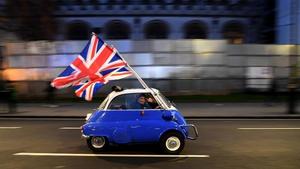 This file photo shows a man waves Union flags from a BMW Isetta as he drives past Brexit supporters gathering in Parliament Square, in central London on Jan 31, 2020, the day that the UK formally leaves the European Union. (DANIEL LEAL-OLIVAS / AFP)
This file photo shows a man waves Union flags from a BMW Isetta as he drives past Brexit supporters gathering in Parliament Square, in central London on Jan 31, 2020, the day that the UK formally leaves the European Union. (DANIEL LEAL-OLIVAS / AFP)
The UK will introduce a temporary light-touch customs regime at its border with the European Union next year, in an attempt to avoid piling burdens on businesses already struggling with the impact of coronavirus.
Under the plan, the new light-touch border checks will come into force whether or not the UK and EU reach a new trade deal at the end of the year
Cabinet Office Minister Michael Gove will detail the plan Friday when he formally rules out extending the Brexit transition period beyond the end of the year, a person familiar with the matter said.
The new border policy emerged after Britain and the EU agreed to step up the pace of their trade negotiations, following months of sometimes bad-tempered deadlock.
ALSO READ: UK says on Brexit: Progress is limited & talks need to speed up
Prime Minister Boris Johnson and European Commission President Ursula von der Leyen will hold a call on June 15 aimed at injecting momentum into the talks over the future relationship.
With just six months left to reach a new trade accord, Johnson has faced calls to extend the Brexit transition period beyond the Dec 31 deadline to allow more time for negotiating. That’s when the UK is due to exit the EU’s single market and tariff-free customs union.
Until now, the UK had planned to impose full border checks on all goods entering the country from the EU from Jan 1. But ministers now realize that a pragmatic approach is needed to help businesses cope when they are already struggling with the virus, the person said.
Raises the Stakes
Under the plan, the new light-touch border checks will come into force whether or not the UK and EU reach a new trade deal at the end of the year.
Gove will formally rule out extending the transition period at a meeting with European officials Friday, which the British side says represents the final legal point at which the UK could ask for a delay to the deadline.
That raises the stakes in the talks and adds to the risks of economic disruption if they fail. With this in mind, Johnson will hold a call with Von der Leyen, European Council President Charles Michel and EU Parliament President David Sassoli on the afternoon of June 15, according to a tweet from Michel’s spokesman Thursday.
ALSO READ: EU looks to Johnson to stop no-deal Brexit with talks stuck
Five rounds of weekly trade negotiations will begin at the end of June.
“This new process will involve a mix of formal negotiating rounds and smaller group meetings, both in London and Brussels assuming public health guidelines enable this,” a UK government spokesman said Thursday.
Johnson had previously threatened to walk away from the talks in June if it wasn’t clear that he was going to get an acceptable deal. The continuation of talks into the summer means businesses, already reeling from the coronavirus pandemic, will face a longer wait for certainty over what Britain’s post-Brexit trade relationship with the EU will look like.
Compromise Possible?
Britain is resisting the EU’s demands over fishing and rules designed at ensuring a level competitive playing field between the two sides -- two preconditions Brussels has put on any deal. But after last week’s round of talks, Michel Barnier, the EU’s chief negotiator, hinted that a compromise may be possible over fishing and the level playing field.
European diplomats yesterday rebuffed UK calls to loosen Barnier’s mandate. The bloc insists that any deal includes provisions covering fishing rights, fair competition and dispute settlement.
READ MORE: UK cautions EU against financial 'self harm' over Brexit
A memo circulated after the ambassadors’ meeting depicted a situation of “limited progress” in negotiations so far, accusing the UK of a “pick and choose” approach and calling for increased preparedness for a chaotic separation at the end of the year.
Britain said it had agreed an intensified timetable for free trade negotiations with the EU in July as both sides try to strike an agreement by the end of the year.
“This new process will involve a mix of formal negotiating rounds and smaller group meetings, both in London and Brussels, assuming public health guidelines enable this,” the government said in a statement.
There would be talks each week between weeks starting June 29 and July 27.
READ MORE: Round four: UK, EU back in the Brexit ring
Britain formally left the EU at the end of January but little has yet changed in its relationship with the bloc due to a transition period which lasts for the rest of the year.
Talks on a comprehensive future relationship deal between Britain and the 27-nation EU have hardly progressed since February.
British Prime Minister Boris Johnson, the chairman of European Union leaders Charles Michel and the head of the European Commission Ursula von der Leyen will hold talks on June 15 to revive stalled discussions.


